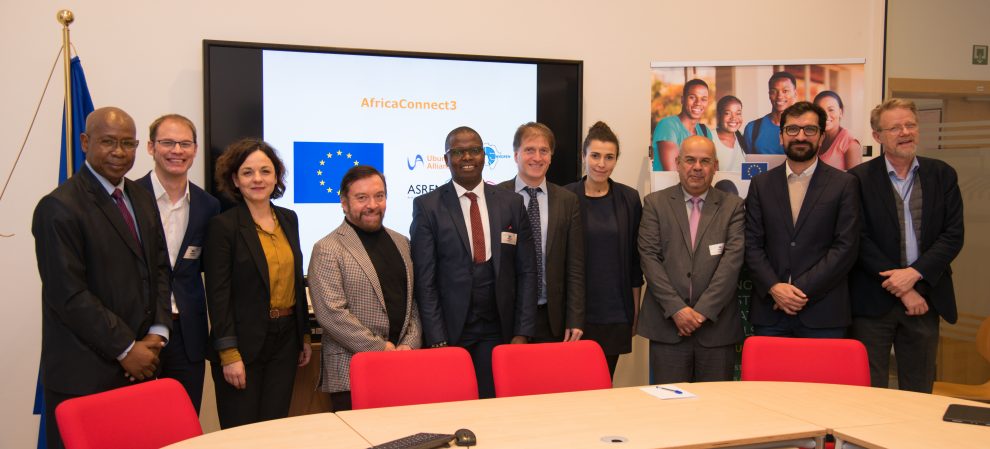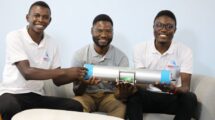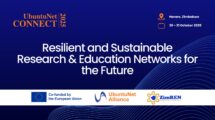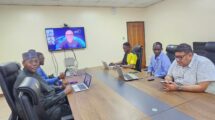After six years of contributing to AfricaConnect and Africa’s digital transformation, our International Cooperation Officer at DG INTPA, Stéphanie Truillé-Baurens, is pursuing the next chapter of her career.
Stéphanie’s enthusiasm and drive for the development of National Research and Education Networks (NRENs) all across the African continent has been very impactful during her time with AC3. Her solid experience in working with community-driven organisations has been of great inspiration for all project partners through out the years.
“There is nothing stronger than human networks and that they are more important than ever if we are to address the global challenges we face.” Stéphanie Truillé-Baurens, International Cooperation Officer, DG INTPA
For the occasion, AfricaConnect3 has interviewed Stéphanie to gain some insights into what it meant to her to be working side by side with African educators and technologists with the purpose of unlocking the potential of the continent. All her colleagues at the UbuntuNet Alliance, WACREN, ASREN and GÉANT are deeply thankful to Stéphanie for her dedication and crucial contributions to the field.
Stéphanie, you have been working in the field of Africa’s digital transformation for the past 6 years. What was your first impression of National Research and Education Networks (NRENs) and how have you seen their role changing during your time working with them?
When I was introduced to the NREN topic, what initially struck me was that it seemed a very specialised, technical topic which appeared only remotely connected to the needs of the African people. But the more I got to understand, the more I realised that their activities were actually key to deliver on the SDGs and enhance human development. Over the last few years, I am not convinced that the role of NRENs has significantly evolved, but what has changed tremendously is the perception of “outsiders” towards them, with the growing realization that they play a central role in supporting quality education and research collaboration, an understanding that has been accelerated by the COVID pandemic.
What do you think makes NRENs, in a nutshell, key players for the future of African students and learners?
African NRENs have, in my view, a unique combination of highly specialised knowledge of digital networks and an in-depth understanding of the needs of their users (students, academic staff, researchers…). That is what makes them central players for the future of African education and research activities.
During your time with AfricaConnect, you have been closely working with all three regional clusters (the UbuntuNet Alliance, WACREN and ASREN). Would you like to share your favourite memories of a time for when you worked alongside each of them?
I have very fond memories of moments where I have worked directly with the three organisations. But if I were to mention one key moment, I would refer to a “brainstorming” session that we held in October 2017. During two full days, we locked ourselves in a room with no other objective than to talk freely, exchange ideas and even dream a little of what we could do under – what is now – AfricaConnect3. It was a very dense and rich moment and I think it helped set solid grounds for the work that is currently being done by the partners. Of course, I will also keep vivid memories of UbuntuNet Alliance, WACREN and ASREN annual conferences, which always combine interesting presentations, debates and social moments organised by the host countries.
You have been incredibly supportive and proactive in backing up AfricaConnect’s mission and vision for the R&E communities. What have you found most interesting working with the project partners and users? Who or what has been inspiring you?
What has been most inspiring in working with partners under AfricaConnect is the fact that they are the ones driving the whole process. Our role as European Commission is merely to support their work and facilitate it wherever possible. The very idea that, without external support, they would have looked for alternative solutions to serve their users is a demonstration of their commitment and ownership, two notions that are critical for the success of any international collaboration effort.
You have a great deal of experience working not only with African NRENs but more widely in the digitalisation of the continent. Where do you see this field going in the next 10 years? What is the priority of DG INTPA in relation to the development of e-infrastructure and technologies for the benefit of African R&E users?
Any attempt at predicting how digitalisation will have changed the African continent in 10 years time is likely to fail as the transformation is taking place at a dizzy speed. But the EU is convinced that it can offer Africa tremendous opportunities. That is why supporting an inclusive digital transformation in partner countries is one of the key priorities of the European Commission for the coming years. As far as African R&E users are concerned, they will undoubtedly benefit from DG INTPA interventions to enhance equitable access to affordable, secure and quality digital infrastructures as well as promoting human-centric digital standards and regulatory frameworks.
Stéphanie, we are curious to know what the future has in store for you and wish you the best in your professional endeavors. Will you still be collaborating with African R&E communities? What key lessons are you going to take on board in your next adventure?
Thank you for your best wishes. Without exaggerating, I can say that I have been looking very hard for a new professional opportunity that would enable me to work closely with African NRENs. I think I found it at the French agricultural research and cooperation organisation CIRAD in Montpellier where I will start on 1st September 2021. The key lesson learned that I will take with me from working with the African R&E community is that there is nothing stronger than human networks and that they are more important than ever if we are to address the global challenges we face.
Thank you Stéphanie for your precious messages. Best of luck in your future endeavours!





